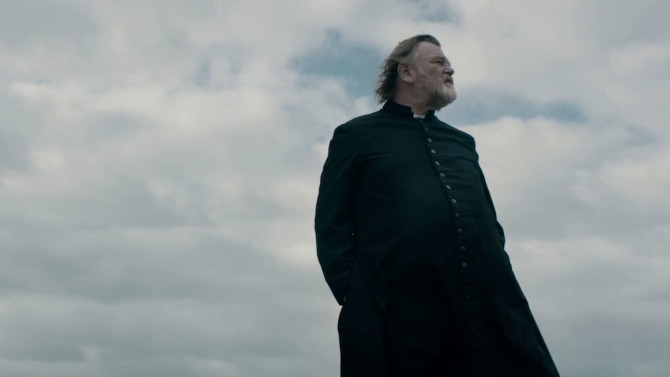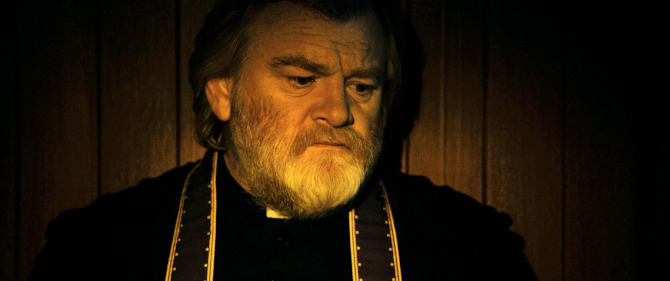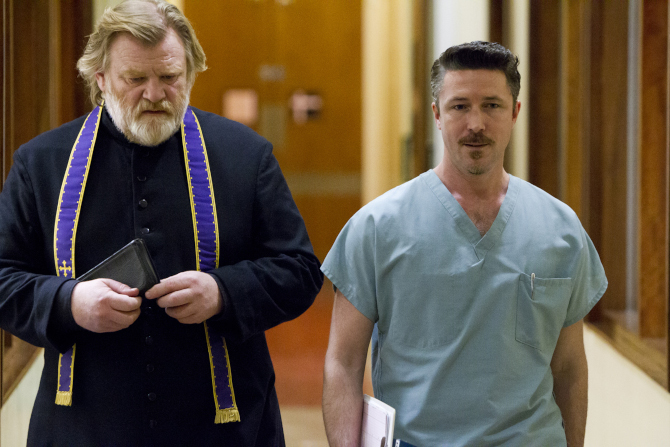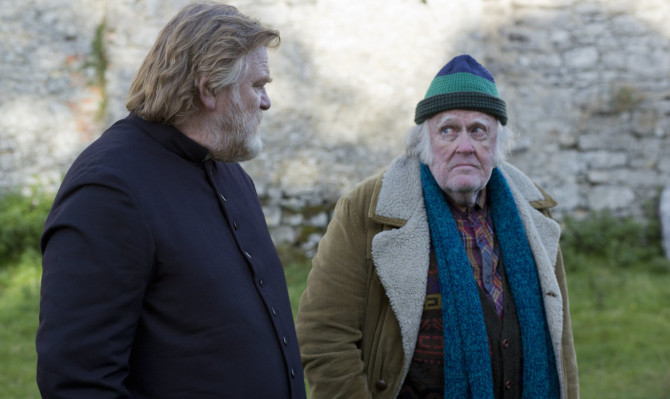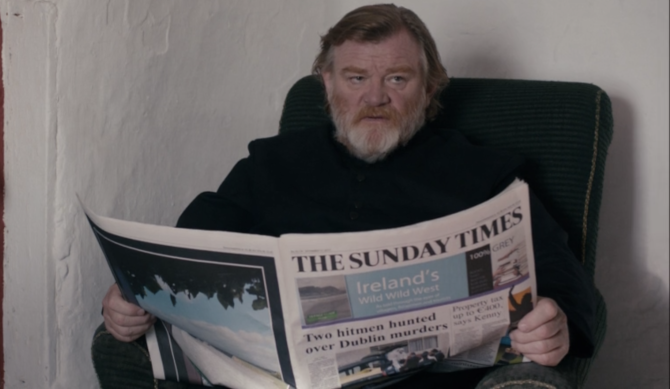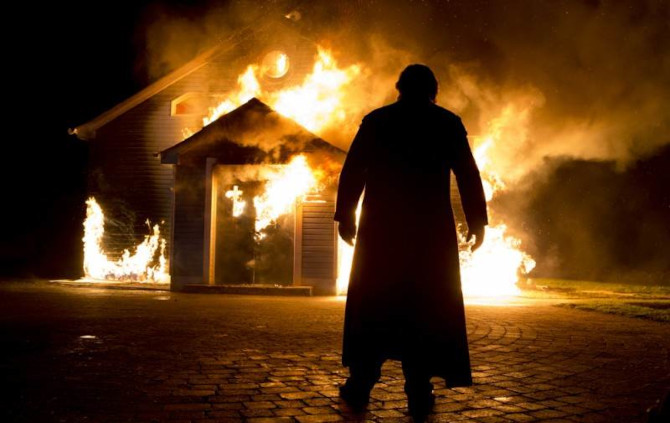John Michael McDonagh’s follow up to The Guard, 2014’s Calvary (which he again writes and directs), is a thought provoking mystery infused drama which delves into irony, theology, predestination, and how the wounds of the past influence the present in most powerful ways.
Opening with a quotation from Saint Augustine – “Do not despair; one of the thieves was saved. Do not presume; one of the thieves was damned.”, we are then introduced to our main character, Father James (Brendan Gleeson), a good man in small town Ireland. Originally married with a daughter, when his wife died, he followed a calling to the priesthood, attempting to impart his spiritual wisdom and some much needed solace to his flock.
Starting like a punch in the gut, as Father James is taking confessions on Sunday, one of his parishioners threatens to murder him (as it would make a much larger statement killing a good priest rather than a bad one). . . the unknown man gives him until the following Sunday to get things in order.
Placed in a rather unorthodox situation, James does not know whether he should break the holy sacrament of confession and bring the threat to the police. Deciding to go about his work like he would normally do, he attempts to rectify a number of issues within his community, namely: the relationship between married couple Jack (Chris O’Dowd) and Veronica Brennan (Orla O’Rourke) – the former confides to the priest, “I think she’s bipolar, or lactose intolerant, one of the two”; Veronica is not so secretly having an affair with mechanic Simon (Isaach De Bankolé); a rich yet wholly apathetic investor, Michael Fitzgerald (Dylan Moran); an elderly American Writer living in seclusion contemplating his own death (M. Emmet Walsh); a multi-murderer, Freddie Joyce (Domhnall Gleeson), who might or might not be showing contrition; the rather cynical and often confrontational atheist Dr. Harte (Aidan Gillen); a young man, Milo Herlihy (Killian Scott) who is struggling to get laid so is considering joining the army; the local bartender, Brendan Lynch (Pat Shortt), who he gets into a little tiff with; the local Inspector, Stanton (Gary Lydon), who helps him out with some unusual requests; an American male prostitute, Leo (Owen Sharpe); while the much younger priest (who is lacking integrity) he is paired with, Father Leary (David Wilmot), is not exactly fitting into the community. Also, his suicidal daughter, Fiona (Kelly Reilly), has come for a visit from Dublin.
Broken up in a day to day countdown of sorts, Father James continues to aid each and every one of these individuals in his own unique way (including his would-be killer – which is not revealed until the very end), while he contemplates his own mortality, bravery, and sins (though he always thought more attention should be paid to virtues – especially forgiveness). He must also battle against the scandals of the church, an example of a good priest being hampered by the sins of others. Over this one week, conversations revolving around murder in self defense, faith, death, and many other telling subjects seem to direct him in his purpose, providing him with spiritual guideposts in this atypical situation.
Though all of this might sound a bit morose, like so many Irish films, there is a certain dark, and often ironic comedy etched throughout (as referenced above with Jack’s comment about his wife). McDonagh is clearly having fun layering his dialogue, as many of his characters have self-referential comments, hinting at the meta of movies (i.e. the stereotypical atheist doctor playing his role opposite the much more meaty persona of the good priest). You’ve also got to give him credit in how he develops his characters. . . each actor given a realistic, well rounded role, be it big or small – this is a group well worth lauding. You might also have noticed that there are twelve local townsfolk in the stratosphere of our main character, for they are much like his twelve disciples – one of them the Judas. Even in the pressing final moments, McDonagh never forgets about all of these characters (a thoughtful, thinking man’s approach to a movie built around a quality ensemble).
Also worth noting, there are some rather cool tie-ins to his previous films, as well as those of his brother Martin. At one point early on, look for Father James reading a newspaper in which the headline screams, “Two Hitmen Hunted Over Dublin Murder” – think they’d better check In Bruges, while many of the bar scenes echo those found in his short film The Second Death (2000). The same young boy (Michael Og Lane) found in The Guard also plays a similar (though at the same time different) role in Calvary, this time he is altar server to Father James, while also being an almost visionary artist who always seems to be around.
For those of you wondering what Calvary means, it is Latin for skull, the name of the place outside of Jerusalem where Jesus was crucified. As per definitions, it can also mean ‘an experience of usually intense mental suffering’, meaning that this is a most fitting word. Look for added depth in conversations, pieces of art, and everything in between. So, come take a butcher’s at this Irish gem, it’s well worth a shot.

